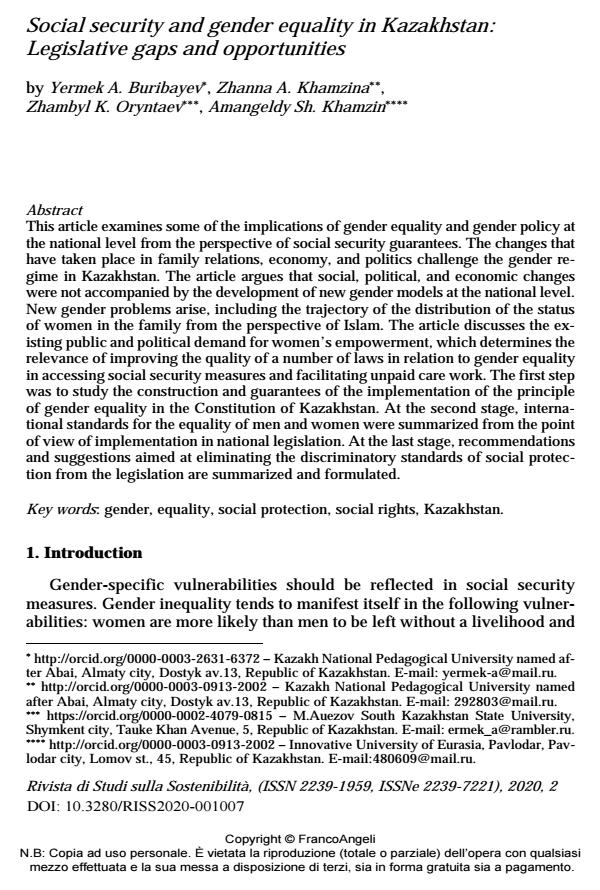Social security and gender equality in Kazakhstan: Legislative gaps and opportunities
Journal title RIVISTA DI STUDI SULLA SOSTENIBILITA'
Author/s Yermek A. Buribayev, Zhanna A. Khamzina, Zhambyl K. Oryntaev, Amangeldy Sh. Khamzin
Publishing Year 2021 Issue 2020/2
Language English Pages 22 P. 103-124 File size 140 KB
DOI 10.3280/RISS2020-002007
DOI is like a bar code for intellectual property: to have more infomation
click here
Below, you can see the article first page
If you want to buy this article in PDF format, you can do it, following the instructions to buy download credits

FrancoAngeli is member of Publishers International Linking Association, Inc (PILA), a not-for-profit association which run the CrossRef service enabling links to and from online scholarly content.
This article examines some of the implications of gender equality and gender policy at the national level from the perspective of social security guarantees. The changes that have taken place in family relations, economy, and politics challenge the gender regime in Kazakhstan. The article argues that social, political, and economic changes were not accompanied by the development of new gender models at the national level. New gender problems arise, including the trajectory of the distribution of the status of women in the family from the perspective of Islam. The article discusses the existing public and political demand for women’s empowerment, which determines the relevance of improving the quality of a number of laws in relation to gender equality in accessing social security measures and facilitating unpaid care work. The first step was to study the construction and guarantees of the implementation of the principle of gender equality in the Constitution of Kazakhstan. At the second stage, international standards for the equality of men and women were summarized from the point of view of implementation in national legislation. At the last stage, recommendations and suggestions aimed at eliminating the discriminatory standards of social protection from the legislation are summarized and formulated.
Keywords: Gender, equality, social protection, social rights, Kazakhstan.
- Constitutional Council (1999a). On the official interpretation of paragraph 2 of Article 13, paragraph 1 of Article 14, paragraph 2 of Article 76 of the Constitution of the Republic of Kazakhstan. Resolution of the Constitutional Council of the Republic of Kazakhstan dated March 29, 1999 No. 7/2.
- Constitutional Council (1999b). On the official interpretation of paragraphs, 1 and 2 of article 14, paragraph 2 of article 24, subparagraph 5) of paragraph 3 of article 77 of the Constitution of the Republic of Kazakhstan. Resolution of the Constitutional
- Council of the Republic of Kazakhstan dated March 10, 1999 No. 2/2. Constitutional Council (2005). On checking the constitutionality of paragraph 3 of Article 15 of the Law of the Republic of Kazakhstan “On Notaries” at the appeal of the court of the city of Astana. Resolution of the Constitutional Council of the Republic of Kazakhstan dated January 31, 2005 No. 1.
- Grybaitė V. (2006). Gender equality in the labor market: women and men wage differentials. Business: Theory and Practice, 7(3): 168-173.
- ILO, 2017 International Labour Organization. (2017). World Social Protection Report 2017-19: universal social protection to achieve Sustainable Development Goals. International Labour Organization.
- Kapur R. (2016). Gender Equality: Constitutional Challenges and Competing Discourses. In: The Oxford Handbook of the Indian Constitution. Oxford University Press.
- Kaufman E. (2005). Women and Law: A Comparative Analysis of the United States and Indian Supreme Courts’ Equality Jurisprudence. Ga. J. Int’l & Comp. L., 34:
- 557. Kazakhstan (2016). The concept of family and gender policy in the Republic of Kazakhstan until 2030, approved by Decree of the President of the Republic of Kazakhstan dated December 6, 2016 No. 384.
- Kazakhstan (2020). Reports on the consideration of civil cases by the courts of the first instance. Statistical data on the consideration of civil cases of the Supreme Court of the Republic of Kazakhstan. -- URL: http://sud.gov.kz/rus/content/statisticheskie-dannye-o-rassmotrenii-grazhdanskih-del; Reports on the work of the courts of the first instance in civil matters at the information service of the Committee of Legal Statistics and Special Accounting of the General Prosecutor’s Office of the Republic of Kazakhstan. URL: https: //qamqor.gov.kz.
- Khamzina Z., Buribayev Y., Yermukanov Y., Alshurazova A. (2020). Is it possible to achieve gender equality in Kazakhstan: Focus on employment and social protection. International Journal of Discrimination and the Law, 20(1): 5-20.
- Newton J. (2016). “Making social protection gender sensitive for inclusive development in Sub-Saharan Africa”, INCLUDE Knowledge Platform on Inclusive Development Policies. -- URL: https://includeplatform.net/wp-content/uploads/2016/01/INCLUDE-GRF-Newton-Making-Social-Protection-Gender-Sensitive.pdf.
- Noon M. (2010). The shackled runner: time to rethink positive discrimination?. Work, Employment and Society, 24(4): 728-739.
- Norris P. (2001). Breaking the barriers: Positive discrimination policies for women. In: Has Liberalism Failed Women? (pp. 89-110). New York: Palgrave Macmillan.
- OECD (2017). Gender Policy Delivery in Kazakhstan. OECD Public Governance Reviews, OECD Publishing, Paris.
- OECD (2019). SIGI 2019 Global Report: Transforming Challenges into Opportunities, Social Institutions, and Gender Index. OECD Publishing, Paris.
- Plagerson S., Hochfeld T., Stuart L. (2019). Social Security and Gender Justice in South Africa: Policy Gaps and Opportunities. Journal of Social Policy, 48(2): 293-310.
- Rashkova E.R. (2017). Talking the talk, but not walking the walk: gender equality in Eastern Europe. East European Politics, 33(2): 309-315.
- Report (2011). National report on the implementation of the UN Convention on the Elimination of All Forms of Discrimination against Women. -- URL: http://www.akorda.kz.
- Report (2018). On approval of the report on the implementation of the Convention on the Elimination of All Forms of Discrimination against Women. Decree of the Government of the Republic of Kazakhstan dated February 28, 2018 No. 89.
- Stephens S. (2010). Adopting a positive action approach to sex discrimination. Alternative Law Journal, 35(1): 36.
- UN, 2015 United Nations. (2015). Transforming our world: The 2030 agenda for sustainable development. General Assembly 70 session.
Yermek A. Buribayev, Zhanna A. Khamzina, Zhambyl K. Oryntaev, Amangeldy Sh. Khamzin, Social security and gender equality in Kazakhstan: Legislative gaps and opportunities in "RIVISTA DI STUDI SULLA SOSTENIBILITA'" 2/2020, pp 103-124, DOI: 10.3280/RISS2020-002007